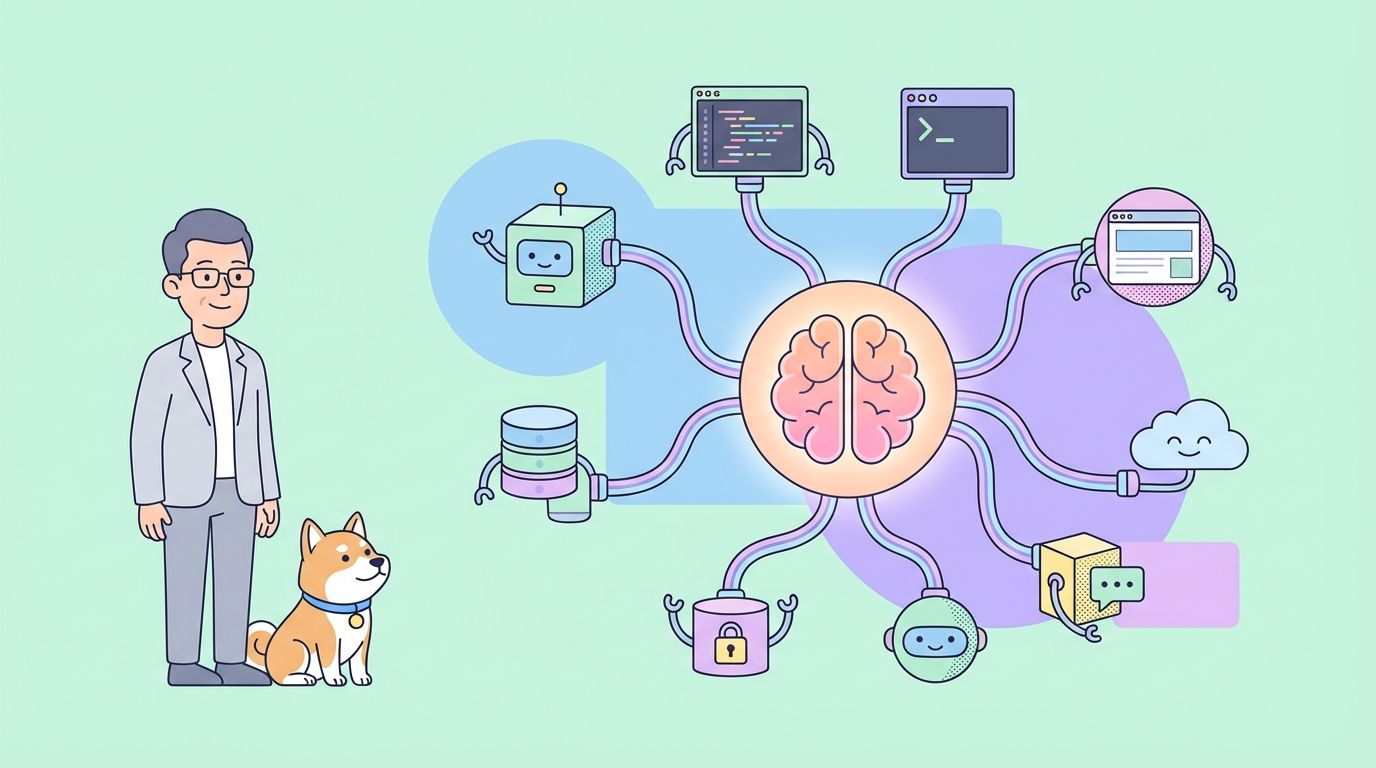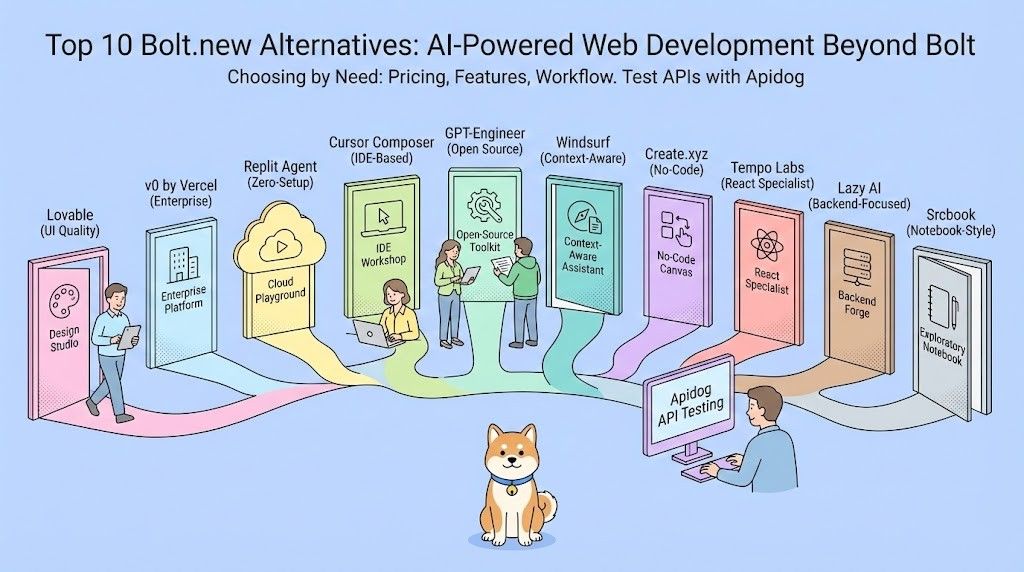APIs are no longer just "technical glue" between applications. They’ve become the powerhouses of modern software, enabling seamless integration across systems and platforms. From mobile apps to SaaS products, cloud services, and IoT devices, APIs are everywhere. But here’s the thing: simply building an API isn’t enough.
To make the most of APIs, organizations need to manage them effectively throughout their entire lifecycle from design and development to deployment, security, monitoring, and retirement, which is a no small feat. This is why full lifecycle API management platforms have emerged as essential tools for organizations aiming to accelerate innovation, ensure security, and optimize operational efficiency.
That's where full lifecycle API Management platforms come in.
These platforms don't just help developers create APIs. They ensure APIs remain secure, scalable, discoverable, and high-performing. And in today’s competitive environment, choosing the right platform can make or break your API strategy.
Want an integrated, All-in-One platform for your Developer Team to work together with maximum productivity?
Apidog delivers all your demands, and replaces Postman at a much more affordable price!
In this blog post, we’ll explore the top 10 full lifecycle API management platforms, including their features, strengths, and why they stand out.
What is Full Lifecycle API Management?
Full lifecycle API management refers to the end-to-end process of managing APIs across all stages of their existence. In simple terms, full lifecycle API management covers every stage of an API's journey.
This includes:
- Design & Prototyping: Create mock APIs and define API contracts and schemas specifications.
- Development & Testing: Build endpoints, test performance, and ensure reliability with automated testing and version control.
- Deployment: Publishing APIs with governance controls and security enforcement, launching APIs into production with versioning.
- Security & Governance: Managing policies, access control, protect APIs with authentication, authorization, and monitoring.
- Monitoring & Analytics: Track usage, errors, latency, performance, security in real time and business metrics.
- Retirement: Sunset outdated APIs while migrating clients smoothly, phasing out deprecated API versions with minimal disruption.
Instead of stitching together multiple tools, platforms offering full lifecycle API management provide integrated tools and workflows to support every one of these stages within a single ecosystem.
Why Is Full Lifecycle API Management Critical?
You might ask: Why can’t we just build and expose APIs directly? Managing APIs piecemeal with separate tools for documentation, testing, security, and monitoring leads to inefficiencies, inconsistencies, and higher operational risks.
A holistic approach:
- Ensures consistency: One source of truth for API definitions and versions.
- Accelerates development: Collaborative design, automated testing, and CI/CD integrations.
- Strengthens security: Uniform security policies and real-time threat detection.
- Improves observability: Unified dashboards for performance, errors, and usage.
- Enables agility: Rapid iterations, governance automation, and easy monetization.
In short, it supercharges your API strategy and increases developer productivity, collaboration, and end-user satisfaction.
Well, without proper management:
- APIs become security risks.
- Poor documentation means low adoption.
- Lack of monitoring makes it impossible to spot performance bottlenecks.
- Scaling APIs without governance leads to chaos.
A robust API management platform solves all of these by ensuring your APIs are secure, governed, and optimized for growth.
Key Features of Full Lifecycle API Management Platforms
When evaluating platforms, look for these features:
- API Design Tools (support for OpenAPI, GraphQL, etc.)
- Mocking & Testing capabilities
- Developer Portals & Documentation
- Security Features (OAuth2, JWT, API Keys)
- Analytics & Monitoring Dashboards
- Gateway & Traffic Control
- Versioning and Lifecycle Policies
- Integration with CI/CD pipelines
1. Apidog
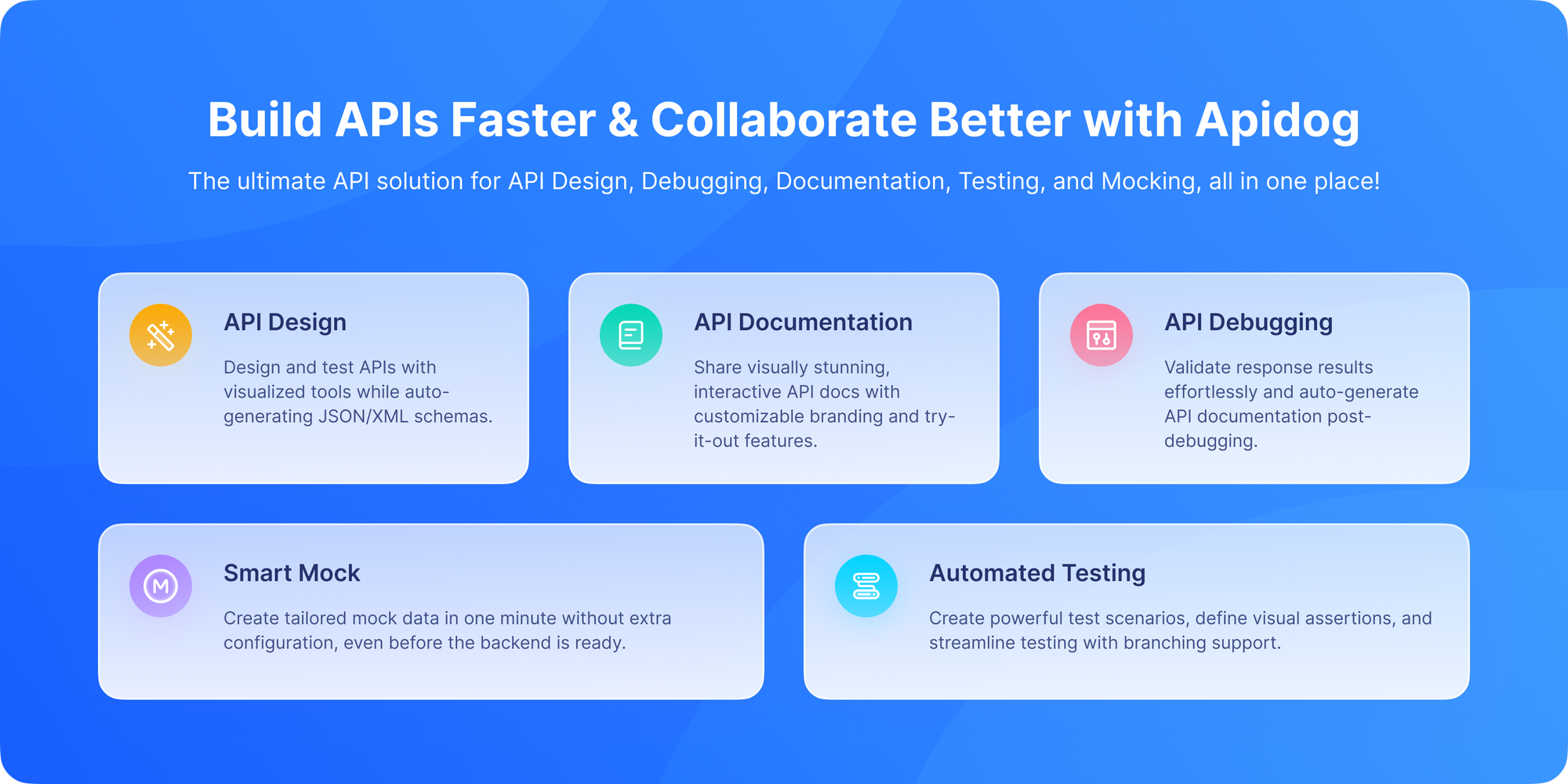
If you’re looking for an API management platform that balances simplicity and enterprise power, Apidog should be your first stop.
Apidog offers everything developers and businesses need across the full lifecycle:
- Design & Documentation: Create APIs visually with OpenAPI and GraphQL support.
- Mocking & Testing: Simulate APIs before they’re live.
- Collaboration: Share APIs easily across teams.
- Version Control: Manage multiple versions smoothly.
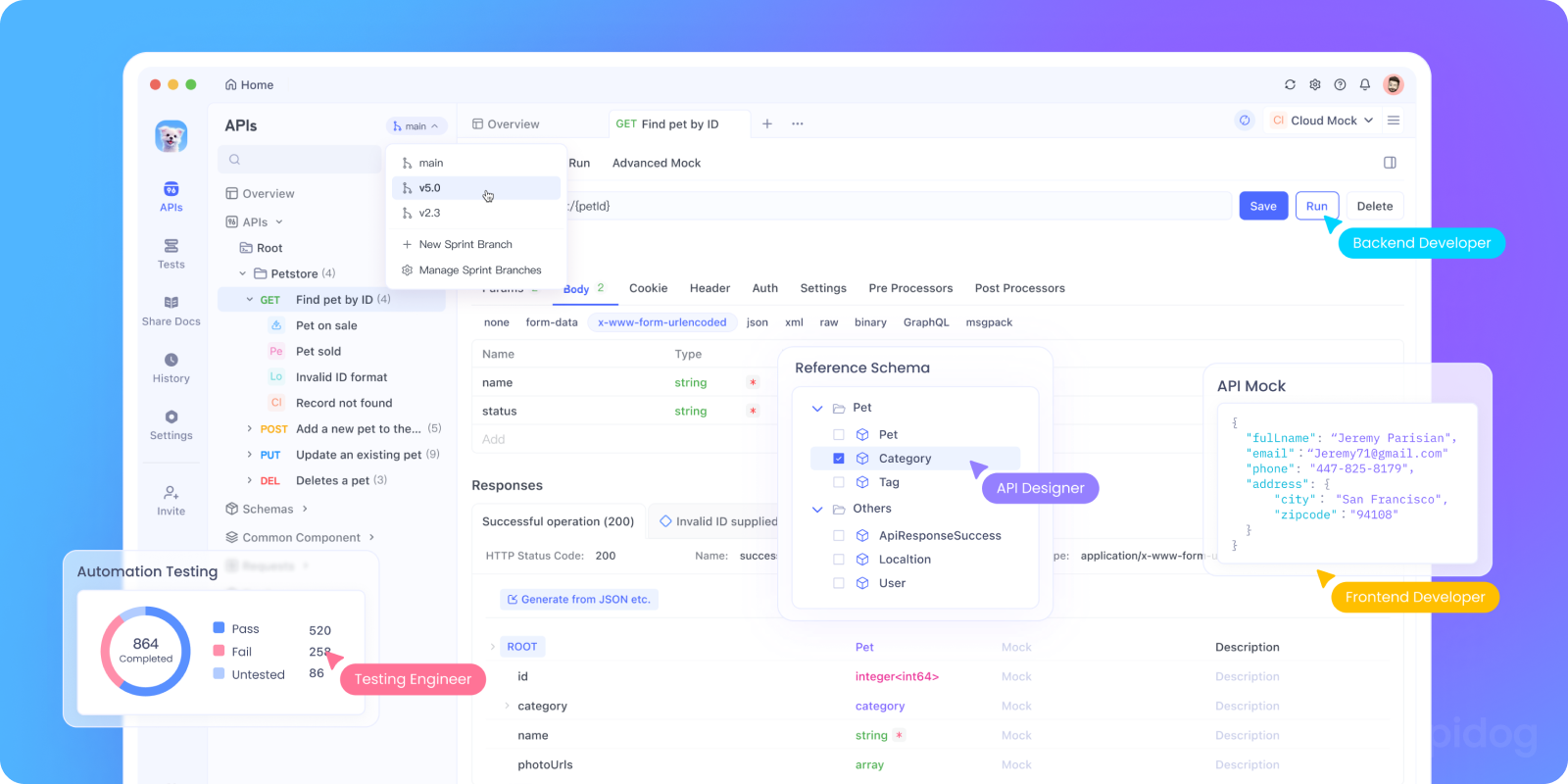
Why Apidog stands out:
- It’s developer-friendly, unlike many "legacy" enterprise tools.
- It integrates design, testing, and documentation in one place.
- It’s affordable, making it accessible for startups and large enterprises alike.
Apidog brilliantly consolidates all stages of API management into an easy-to-use platform. It’s a favorite for startups and enterprises alike, helping teams ship better APIs faster and maintain control with built-in security and monitoring tools.
If you want to get started today, you can download Apidog for free and see why so many teams are switching to it.
2. Postman

While Postman isn’t a traditional full lifecycle API management platform, it’s worth mentioning because of its huge role in API design, testing, and documentation.
Features:
- Powerful API design and testing environment.
- Automated and manual test runs with CI/CD integration.
- Extensive collaboration features with shared workspaces.
- API documentation generation.
- Mock servers and monitoring.
Pros: Widely adopted by developers for its intuitive interface and strong testing capabilities.
Cons: Less focus on enterprise-level governance and monetization.
3. Apigee (Google Cloud)

Apigee is one of the most well-known API management platforms. It’s built for enterprises that need scalability, governance, and advanced analytics.
Features:
- End-to-end API lifecycle support including design, deployment, and analytics.
- Developer portals and monetization controls.
- Security features with OAuth2, threat protection, and data loss prevention.
- Hybrid and multi-cloud deployment options.
Pros: Excellent enterprise features backed by Google’s infrastructure.
Cons: Higher learning curve and cost for smaller teams.
4. MuleSoft Anypoint Platform

MuleSoft, now part of Salesforce, offers the Anypoint Platform, which provides full lifecycle API management with strong integration features.
Features:
- Unified API design and integration platform.
- Rich API gateway with traffic management and security policies.
- Visual data mapping and orchestration.
- API monitoring and analytics.
Pros: Strong integration capabilities for heterogeneous environments.
Cons: Complex setup and pricing may be prohibitive for SMEs.
5. Kong Konnect
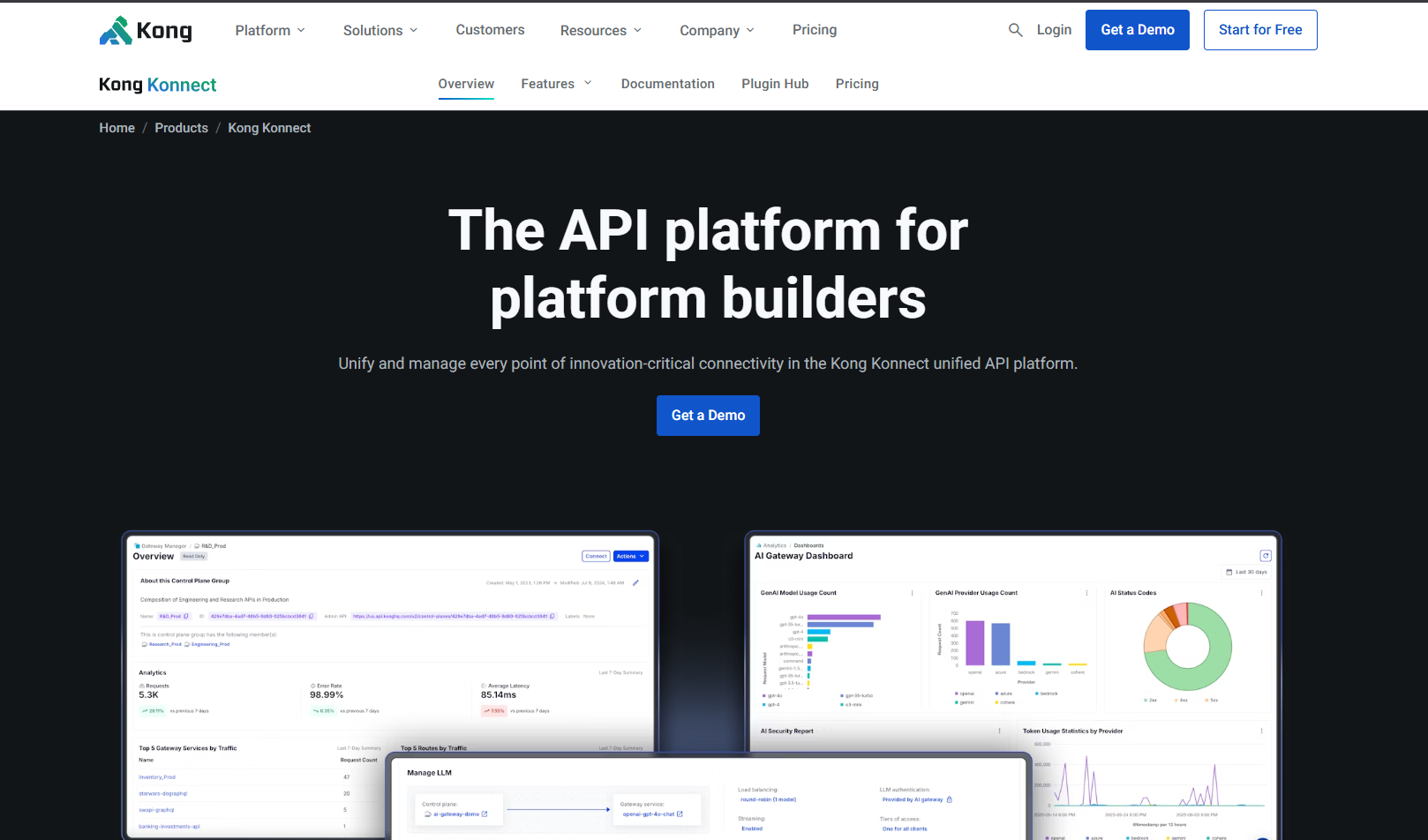
Kong started as an open-source API gateway and has evolved into a full API management platform.
Features:
- Cloud-native and scalable API gateway with lifecycle management.
- Plugin architecture for security, logging, and traffic control.
- Developer portal and analytics dashboards.
- API versioning and governance tools.
Pros: Highly flexible and strong community support.
Cons: Requires technical expertise for advanced configurations.
6. IBM API Connect

IBM’s API Connect is a mature, enterprise-focused platform.
Features:
- Powerful API lifecycle management with security and analytics.
- Automated testing, deployment, and developer collaboration.
- Hybrid cloud deployment models.
- Advanced governance and compliance features.
Pros: Enterprise-grade security and governance.
Cons: Higher cost and complexity.
7. WSO2 API Manager

WSO2 offers an open-source, enterprise-grade API management solution.
Features:
- Open-source full lifecycle management platform.
- API publishing, rate limiting, and analytics.
- Developer portal for onboarding.
- Security with OAuth2 and JWT.
Pros: Cost-effective and highly customizable.
Cons: Requires technical skill to deploy and maintain.
8. Tyk

Tyk is another open-source API management platform that has gained popularity.
Features:
- Lightweight API gateway with lifecycle management capabilities.
- API analytics and documentation.
- Security policies enforcement and throttling.
- Hybrid cloud and on-prem support.
Pros: Simple deployment and open-core model.
Cons: Enterprise features require licensing.
9. AWS API Gateway

Unsurprisingly, Amazon has its own API gateway solution. While it’s not as “full lifecycle” out of the box, it integrates tightly with AWS services.
Features:
- Fully managed service for API creation, deployment, and lifecycle.
- Supports RESTful APIs and WebSocket APIs.
- Security integration with AWS IAM and Cognito.
- Monitoring via CloudWatch.
Pros: Deep integration with AWS ecosystem.
Cons: Limited design and testing features; mostly backend-focused.
10. Azure API Management

Microsoft’s solution for full lifecycle API management is Azure API Management.
Features:
- End-to-end API management including design, security, and analytics.
- Developer portals and gateways.
- Automated policy enforcement and version management.
- Multi-cloud and hybrid support.
Pros: Great for Microsoft-centric environments.
Cons: Complex pricing and configuration.
How to Choose the Right API Management Platform
With so many options, here’s how to choose:
- For startups or modern teams → Apidog is lightweight, cost-effective, and full-featured.
- For enterprises on Google Cloud → Apigee is the natural choice.
- For AWS users → AWS API Gateway integrates seamlessly.
- For Azure shops → Azure API Management works best.
- For open-source fans → Kong, Tyk, or WSO2 are excellent.
Always consider:
- Your cloud environment
- Your budget
- Your need for governance and compliance
- The developer experience
Future Trends in API Management
Looking ahead, API management is evolving fast. Here are some trends:
- AI-driven API monitoring: Detect anomalies and optimize performance automatically.
- GraphQL and Async API support: Moving beyond REST.
- Stronger API security: With zero-trust principles and advanced threat detection.
- API monetization models: Helping businesses generate revenue directly from APIs.
- Integration with DevOps and CI/CD pipelines: Automating the entire lifecycle.
How Apidog Elevates Full Lifecycle API Management
Apidog’s unique strength lies in its all-in-one design that covers every phase of the API lifecycle with ease. Its collaborative focus helps distributed teams work in harmony while maintaining control over security, quality, and performance. Whether you’re prototyping APIs, automating tests, generating docs, or monitoring live traffic, Apidog provides a seamless experience tailored to modern API needs.
Conclusion: Choose Full Lifecycle API Management to Stay Ahead
API management has shifted from a "nice-to-have" to a business necessity. Whether you're a startup building your first SaaS app or an enterprise running global digital platforms, choosing the right full lifecycle API management solution is critical. APIs aren’t static assets; they evolve as your business grows and changes. Managing every phase of your APIs’ lifecycle with a powerful, integrated platform is no longer optional.
It drives innovation, maintains security, and ensures operational excellence. And while there are many great options, Apidog deserves special mention for providing a modern, all-in-one platform that balances simplicity, collaboration, and enterprise features.
So, why wait? Download Apidog for free and discover how full lifecycle API management can empower your teams and transform your digital strategy.


